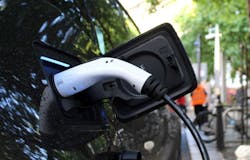March 18, 2021—As automakers prioritize the manufacturing of electric vehicles and consumers continue to push for the more environmentally friendly option, repair shops will need to follow suit. While there will be complexities and uncertainty to overcome as a larger percentage of the clientele owns an EV rather than an ICE, there are some low-risk, cost-effective opportunities that present repair shops can invest in.
One of those is EV charging stations, said Jeff Hudnut, EV expert and product manager at Bosch Automotive Service Solutions.
Hudnut has worked in the industry for 16 years, with most of the last decade spent working with EVs. In his mind, repair shops adding charging stations seems like a natural fit.
Here’s some reasons why:
It’s a customer acquisition tool.
Most EV owners will have a charging station at their house, so implementing a charging station shouldn’t come with the expectation that it will be relied upon by the community all the time, Hudnut said.
But it can be a strong customer acquisition tool. If EV owners are out and about running errands and need a quick charge, having your shop can be a resource. Not only does it get the customer in the building or on the property giving a repair shop the opportunity to establish a connection with the customer, it also shows the customer that the shop is prioritizing EVs and can be a good option when the car inevitably needs some maintenance.
It’s a great marketing tool and it’s cost effective.
It’s not complex or costly.
Speaking of cost, a common misnomer about EV charging stations is that they will run up a high electric bill, Hudnut said, adding that with anything new, the public believes it to be complicated.
But EV charging stations are neither of those things, he said.
“We’re talking about cents, not tens of dollars every time someone plugs in,” Hudnut said, estimating that if someone’s plugged in for two hours, it will likely cost less than $1.25.
For most charging stations, it is as simple as plugging it into an outlet. Hudnut makes sure that Bosch’s charging stations are easy and cost effective to install and that they don’t require maintenance or ongoing software that needs to be installed. It also doesn’t have to have a network connection. So from the moment it’s plugged in, it can begin charging vehicles.
Most systems are designed to respond to the electrical current it’s given, so if it’s plugged into an outlet that can’t meet the maximum voltage the car needs, it won’t override the circuit. Instead it will just charge at a slower pace, working with what it’s given.
Don’t charge customers for charging.
Commonly, EV charging stations will ask that the customer pays for the electricity used to charge the car. But Hudnut advises against that. If it costs $1.25 for two hours of charging, that’s not a large cost to the business. Plus, having the customer sit in the building or parking lot for two hours is much more valuable than the cost of charging.
“You’re capturing a customer for an hour of two, if you can sell one item to them, you’re out front,” he said.
Asking the customer to pay for the charge disincentives them from using the charging stations and can ruin the customer experience and acquisition that was trying to be obtained from the start.
